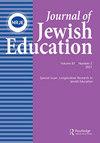Building Our Youth for the Future
IF 0.4
Q4 EDUCATION & EDUCATIONAL RESEARCH
引用次数: 0
Abstract
Even as successive generations of youth reassure their elders, in the words of The Who's 1965 rock anthem, that “the kids are alright,” the adults remain unconvinced. Whether the young are anticipated as agents of progress or continuity, the stakes could not be higher. Hence the imperative articulated by President Franklin D. Roosevelt in a 1940 address at the University of Pennsylvania: “We cannot always build the future for our youth, but we can build our youth for the future.” Concern about youth as the future societal pacesetters and custodians is also a common thread that runs through the three articles in this issue of the Journal of Jewish Education. Nowhere is this theme more pronounced than in Helena Miller and Alex Pomson's article, “When the Heart is Stilled: Adolescent Jewish lives Interrupted by COVID-19.” The authors present and analyze the findings of a recent study of adolescents attending Jewish secondary schools in the UK. As the title of the article suggests, the study, which was funded by the Pears Foundation and the Wohl Legacy Foundation, was designed to measure the impact of SARS-CoV-2 on the respondents’ “Jewish lives.” While the researchers came into the study interested in documenting the schools’ abilities to respond to the challenges presented by COVID-related restrictions, they soon began wondering whether the cancelation and curtailment of Jewish experiences outside of school, including bar mitzvah celebrations, heritage travel to Israel and Eastern Europe, and youth group activities, might have been even more disruptive to the teens’ solidification of their Jewish identities and sense of collective Jewish belonging. Young people, they found, “have been thrown back on the Jewish resources they found under their own roofs,” with varying outcomes. (p. 2) The study found that the pandemic more negatively impacted teens’ emotional wellbeing and academic plans than their connection to Judaism, the Jewish community, or Israel. Nevertheless, the authors express concern that missed opportunities to attend summer camp and engage in heritage tourism would adversely affect the “Jewish communal ecosystem,” since “the young people for whom these experiences serve as a runway to a life of Jewish activism might find it a lot harder to get off the ground.” (p. 17) Curricular Intellectual Who was Ahead of His Time,” surveys the educational contribution of this former head of the Mercaz HaRav Yeshiva in Jerusalem. Prior to becoming head of this national-religious stronghold, which was founded in 1924 by Abraham Isaac Kook, the first Ashkenazi Chief Rabbi in British Mandatory Palestine, Yisraeli was a communal rabbi JOURNAL OF JEWISH EDUCATION 2022, VOL. 88, NO. 3, 177–179 https://doi.org/10.1080/15244113.2022.2102834为未来建设我们的青年
尽管一代又一代的年轻人用谁人乐队1965年的摇滚歌曲“孩子们没事”来安慰他们的长辈,但成年人仍然不相信。无论年轻人是被期待为进步的推动者还是延续的推动者,这都事关重大。因此,富兰克林·d·罗斯福总统在1940年宾夕法尼亚大学的一次演讲中明确表示:“我们不能总是为我们的年轻人创造未来,但我们可以为未来培养我们的年轻人。”关注青年作为未来社会的领跑者和监护人也是贯穿这期《犹太教育杂志》的三篇文章的一个共同主线。这一主题在海伦娜·米勒和亚历克斯·波姆森的文章《当心静止:青少年犹太人的生活被COVID-19打断》中表现得最为明显。作者提出并分析了最近在英国参加犹太中学的青少年的研究结果。正如文章的标题所示,这项由皮尔斯基金会和沃尔遗产基金会资助的研究旨在衡量SARS-CoV-2对受访者“犹太人生活”的影响。虽然研究人员对记录学校应对新冠肺炎相关限制带来的挑战的能力感兴趣,但他们很快就开始怀疑,取消和减少犹太人在校外的经历,包括成人礼庆祝活动、前往以色列和东欧的传统旅行,以及青年团体活动,可能会对青少年固化的犹太身份和犹太集体归属感造成更大的破坏。他们发现,年轻人“被扔回了他们在自家屋檐下找到的犹太资源”,结果各不相同。研究发现,与青少年与犹太教、犹太社区或以色列的联系相比,疫情对青少年的情绪健康和学业计划的负面影响更大。然而,作者表示担心,错过参加夏令营和参与遗产旅游的机会会对“犹太社区生态系统”产生不利影响,因为“年轻人将这些经历作为通往犹太激进主义生活的跑道,可能会发现很难起步。”《领先于时代的课程知识分子》(第17页),调查了这位前耶路撒冷犹太宗教会堂(Mercaz HaRav Yeshiva)校长的教育贡献。在成为这个由亚伯拉罕·艾萨克·库克(亚伯拉罕·艾萨克·库克是英国托管巴勒斯坦的第一位德系犹太首席拉比)于1924年建立的民族宗教堡垒的负责人之前,伊斯利利是一名社区拉比。3,177 - 179 https://doi.org/10.1080/15244113.2022.2102834
本文章由计算机程序翻译,如有差异,请以英文原文为准。
求助全文
约1分钟内获得全文
求助全文

 求助内容:
求助内容: 应助结果提醒方式:
应助结果提醒方式:


